How Much It Cost to Wire a 2,000 Sq Ft House?
Wiring a 2,000 square foot house typically costs between $15,210 and $29,250. This range includes materials, labor, and additional expenses such as permits and system upgrades. Material costs, including wiring, electrical panels, circuit breakers, outlets, and switches, range from $6,240 to $11,570. Labor costs vary from $6,500 to $13,000, depending on the complexity of the job and local rates. Additional costs for permits, inspections, and potential upgrades add another $2,470 to $4,680. Investing in high-quality materials and professional installation ensures a safe, efficient, and durable electrical system.
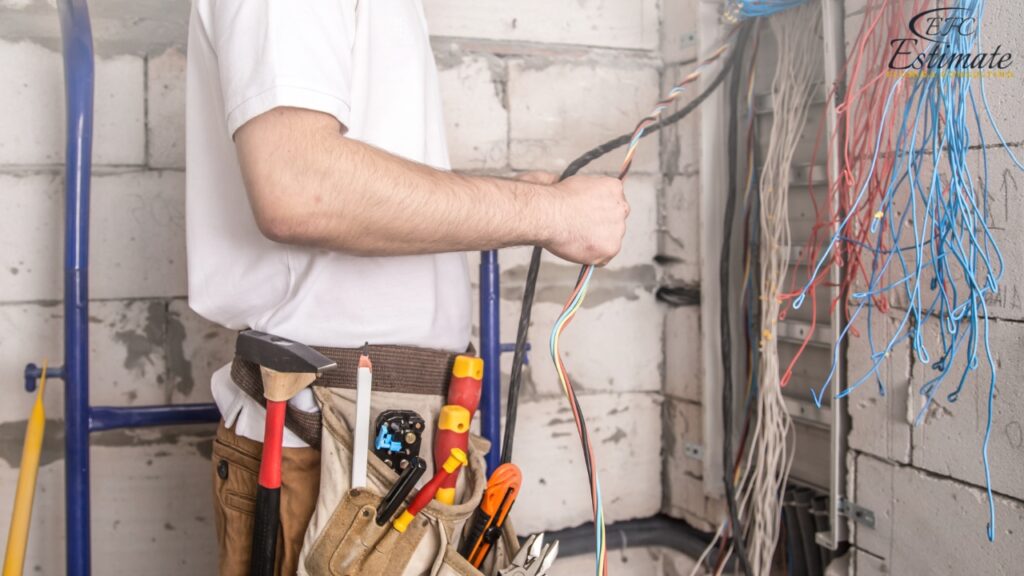
Cost Breakdown for Wiring a 2,000 Sq Ft House
Materials
The cost of materials for wiring a house can vary based on the quality and type of materials used. Here’s a breakdown of the typical costs for wiring materials:
Material | Estimated Cost |
Wiring (2,000 – 3,000 feet) | $2,600 – $4,680 |
Electrical Panels | $1,300 – $2,600 |
Circuit Breakers | $390 – $650 |
Outlets and Switches | $1,300 – $2,600 |
Other Components (junction boxes, connectors, etc.) | $650 – $1,040 |
Wiring
The main component of the electrical system is the wiring itself. High-quality copper wiring is typically used due to its excellent conductivity and durability. The cost varies based on the length and gauge of the wire needed for different circuits in the house. Copper wiring is preferred for its reliability and long lifespan, ensuring a stable electrical system that can handle high loads and provide consistent performance.
Electrical Panels
The electrical panel, or breaker box, distributes electricity to different circuits throughout the house. A high-quality panel is essential for safety and efficiency, and the cost includes the panel itself and the main breaker. A properly installed electrical panel ensures that the electrical system is well-organized and capable of handling the home’s electrical demands, with room for future expansions if needed.
Circuit Breakers
Circuit breakers are crucial for protecting the electrical system from overloads and short circuits. The number of breakers required depends on the number of circuits in the house, and it’s important to choose reliable, high-quality breakers to ensure safety. Circuit breakers provide an added layer of protection, automatically shutting off electricity in case of a fault, preventing damage to the electrical system and reducing the risk of fire.
Outlets and Switches
These components are necessary for providing power and controlling lighting and appliances throughout the house. The cost includes standard outlets, GFCI outlets for wet areas, and various types of switches. High-quality outlets and switches ensure reliable operation and enhance the convenience and functionality of the home’s electrical system. Proper placement and installation of outlets and switches can significantly improve the usability and comfort of the living spaces.
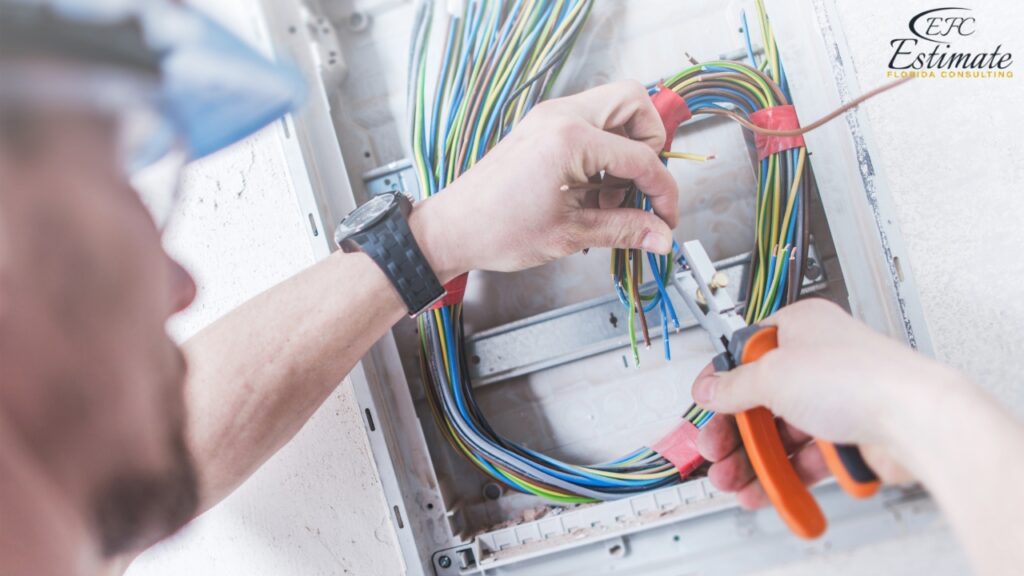
Other Components
Additional components such as junction boxes, connectors, and wiring fasteners are necessary for completing the electrical installation. These small but essential items ensure that the wiring is properly organized and secure. Proper installation of these components helps maintain the integrity and safety of the electrical system, preventing potential issues such as loose connections or wiring damage.
Labor
Labor costs for wiring a house are influenced by the complexity of the job, the local labor market, and the electrician’s experience. Here’s an estimate of the labor costs:
Labor Task | Estimated Cost |
Wiring Installation | $3,900 – $7,800 |
Electrical Panel Installation | $650 – $1,300 |
Outlets and Switches Installation | $1,300 – $2,600 |
Inspection and Testing | $650 – $1,300 |
Wiring Installation
The bulk of the labor cost is for running the wiring throughout the house. This involves measuring, cutting, and installing wires to connect all outlets, switches, and fixtures to the electrical panel. This step requires precision and attention to detail to ensure that the wiring is properly routed and secured, reducing the risk of future issues such as short circuits or power outages.
Electrical Panel Installation
Installing the electrical panel requires precision and expertise to ensure that all circuits are properly connected and protected. This step includes mounting the panel, connecting the main service line, and labeling circuits. A well-installed electrical panel ensures efficient power distribution and easy maintenance, with clear labeling that simplifies troubleshooting and future upgrades.
Outlets and Switches Installation
Installing outlets and switches involves cutting openings in walls, mounting electrical boxes, and connecting the wiring. This task requires careful planning to ensure that outlets and switches are placed conveniently and comply with code requirements. Proper installation of outlets and switches enhances the usability and safety of the home’s electrical system, providing reliable access to power for all electrical devices.
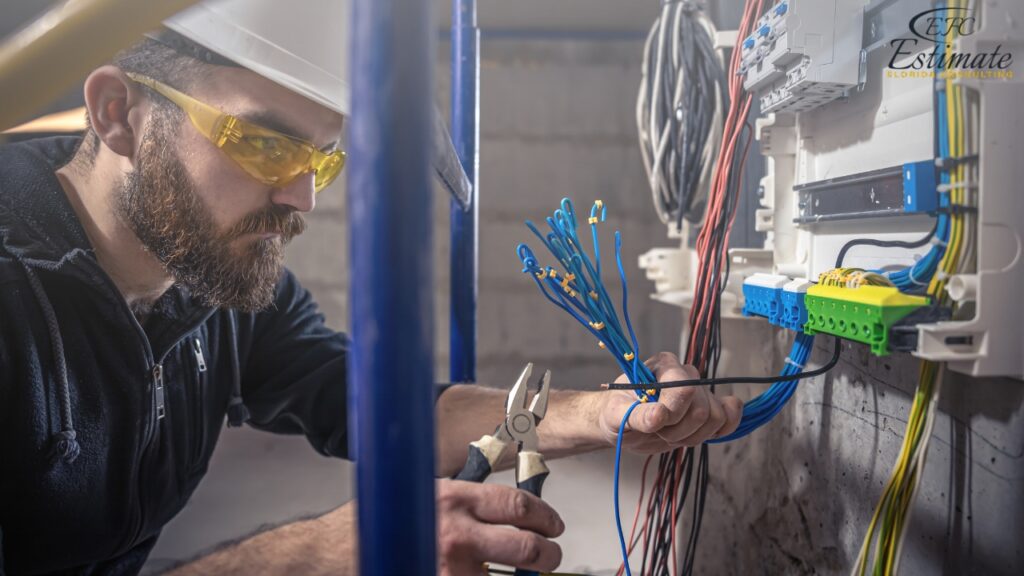
Inspection and Testing
After the installation is complete, a thorough inspection and testing process is essential to ensure that all wiring is properly connected and functioning correctly. This step verifies that the system meets safety standards and is ready for use. Professional testing helps identify any potential issues and ensures that the electrical system is safe and reliable, reducing the risk of electrical failures and hazards.
Additional Costs
Additional costs can include permits, inspections, and any necessary upgrades to the electrical system. Here’s an estimate of the additional costs:
Additional Component | Estimated Cost |
Permits and Inspections | $650 – $1,040 |
System Upgrades | $1,300 – $2,600 |
Miscellaneous Expenses | $520 – $1,040 |
90% More Chances to Win Projects With Our Estimate!
- Multi-Family Building
- Hotel Building
- Hospital Building
- Warehouse Building
- School & University Building
- High-Rise Building
- Shopping Complex
- Data Center Building
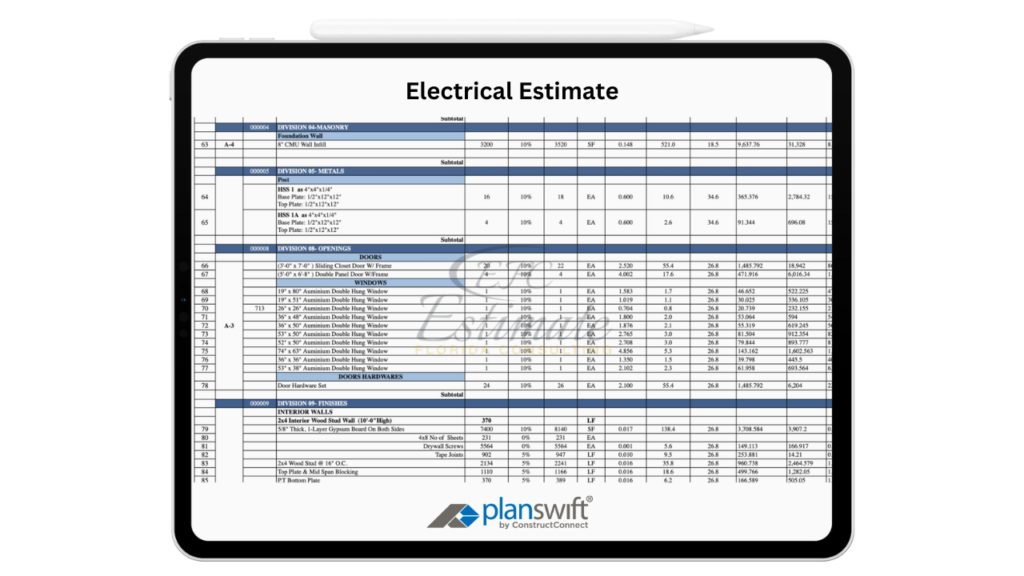
Permits and Inspections
Obtaining the necessary permits and passing inspections are crucial parts of the wiring process. These steps ensure that the electrical work meets local codes and standards, providing safety and compliance. Permit and inspection fees can vary by location, impacting the total cost. Ensuring that all work is properly permitted and inspected helps prevent legal issues and ensures the safety and reliability of the electrical system.
System Upgrades
Depending on the age and condition of the house, additional upgrades may be necessary, such as replacing outdated wiring or installing new systems like home automation. These upgrades enhance the safety and functionality of the electrical system. Upgrading to modern wiring and components can improve energy efficiency and support new technologies, providing long-term benefits for the homeowner.
Miscellaneous Expenses
Miscellaneous expenses can include unexpected costs that arise during the project, such as repairing damaged drywall or addressing unforeseen issues with the existing electrical system. Having a contingency budget for these expenses helps ensure that the project stays on track and can handle any surprises without significant delays or cost overruns.
Total Cost
Here’s a summary of the total estimated costs for wiring a 2,000 square foot house, including materials, labor, and additional expenses:
Cost Category | Estimated Cost |
Total Material Cost | $6,240 – $11,570 |
Total Labor Cost | $6,500 – $13,000 |
Total Additional Costs | $2,470 – $4,680 |
Factors Affecting Wiring Costs
House Layout
The layout and design of the house can significantly impact wiring costs. Complex layouts with multiple floors, intricate room designs, and large open spaces can increase the amount of wiring and labor required. Simple, straightforward layouts are generally less expensive to wire. The accessibility of walls, ceilings, and crawl spaces also affects labor costs, as easier access can reduce the time and effort needed for installation.
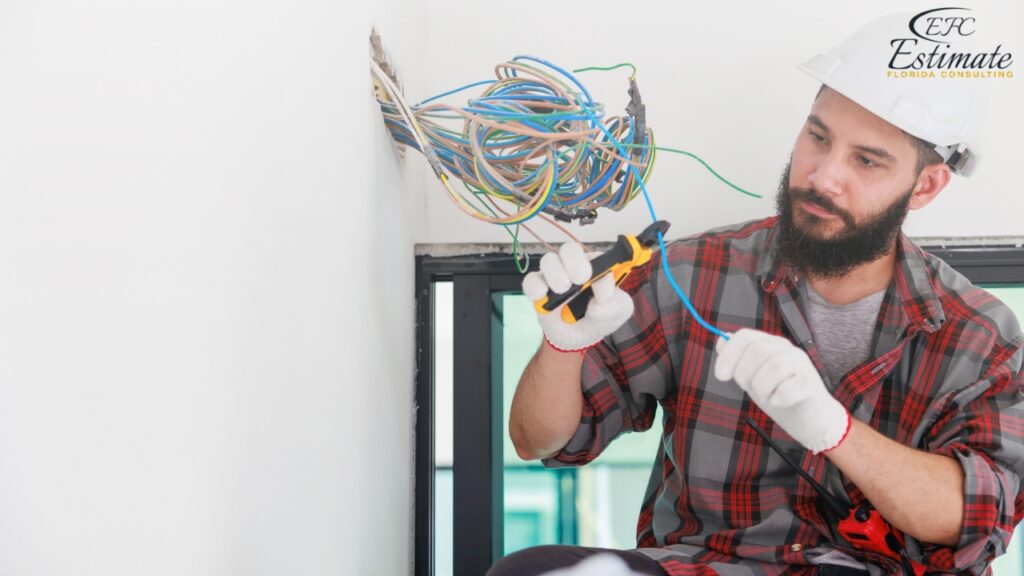
Electrical Needs
The electrical needs of the house, including the number of outlets, switches, light fixtures, and special systems (such as home automation or security systems), will affect the overall cost. Homes with higher electrical demands will require more materials and labor, increasing the total cost. Planning for future electrical needs, such as adding extra outlets or pre-wiring for smart home systems, can add to the initial cost but provide long-term benefits and convenience.
Local Labor Rates
Labor rates can vary widely depending on the location and the electrician’s experience. It’s essential to get multiple quotes from licensed electricians to ensure competitive pricing. Additionally, considering the electrician’s reputation and previous work can help ensure quality and reliability. Higher labor rates in urban areas or regions with a high cost of living can significantly impact the overall wiring costs.
Permits and Inspections
Obtaining the necessary permits and passing inspections are crucial parts of the wiring process. These steps ensure that the electrical work meets local codes and standards, providing safety and compliance. Permit and inspection fees can vary by location, impacting the total cost. Ensuring that all work is properly permitted and inspected helps prevent legal issues and ensures the safety and reliability of the electrical system.
Quality of Materials
The quality of materials used for wiring can affect both the initial cost and the long-term performance of the electrical system. Higher-quality materials tend to be more durable and reliable but come with a higher price tag. Investing in high-quality wiring and components can provide better performance and longevity, reducing the need for repairs and replacements over time.
Detailed Cost Comparison
Material Quality
The quality of materials used for wiring can affect both the initial cost and the long-term performance of the electrical system. Higher-quality materials tend to be more durable and reliable but come with a higher price tag.
Material Quality | Estimated Cost |
Basic | $6,240 – $8,320 |
Mid-Range | $8,320 – $10,560 |
High-End | $10,560 – $11,570 |
Download Template For Electrical Project Breakdown
- Materials list updated to the zip code
- Fast delivery
- Data base of general contractors and sub-contractors
- Local estimators

Labor Complexity
The complexity of the wiring job can influence labor costs. More complex installations, such as those involving smart home systems or extensive outdoor wiring, will require more time and expertise.
Labor Complexity | Estimated Cost |
Basic Installation | $6,500 – $8,450 |
Mid-Range Installation | $8,450 – $10,725 |
High-End Installation | $10,725 – $13,000 |
Additional Features
Adding additional features to the wiring system, such as extra outlets, advanced lighting controls, or integrated home automation systems, can increase the overall cost but provide enhanced functionality and convenience.
Feature | Estimated Cost |
Extra Outlets and Switches | $650 – $1,300 |
Advanced Lighting Controls | $1,040 – $2,080 |
Home Automation Integration | $1,300 – $2,600 |
Benefits of Proper House Wiring
Safety
Proper wiring is essential for the safety of the house and its occupants. Faulty wiring can lead to electrical fires, short circuits, and other hazards. Ensuring that the wiring is done correctly by a licensed electrician minimizes these risks and provides peace of mind. High-quality wiring also includes proper grounding and circuit protection, which are crucial for preventing electrical accidents and ensuring the safe operation of all electrical devices in the home. Investing in proper wiring from the start can save homeowners from costly repairs and potential safety issues down the line.
Efficiency
Modern wiring systems are designed to handle the electrical demands of today’s appliances and technology. Proper wiring ensures that electrical systems run efficiently, reducing energy consumption and lowering utility bills. Efficient wiring also helps prevent overloaded circuits and electrical failures, which can cause inconvenience and additional repair costs. By using energy-efficient wiring and components, homeowners can enjoy a more reliable electrical system that supports all their modern needs without excessive energy costs.
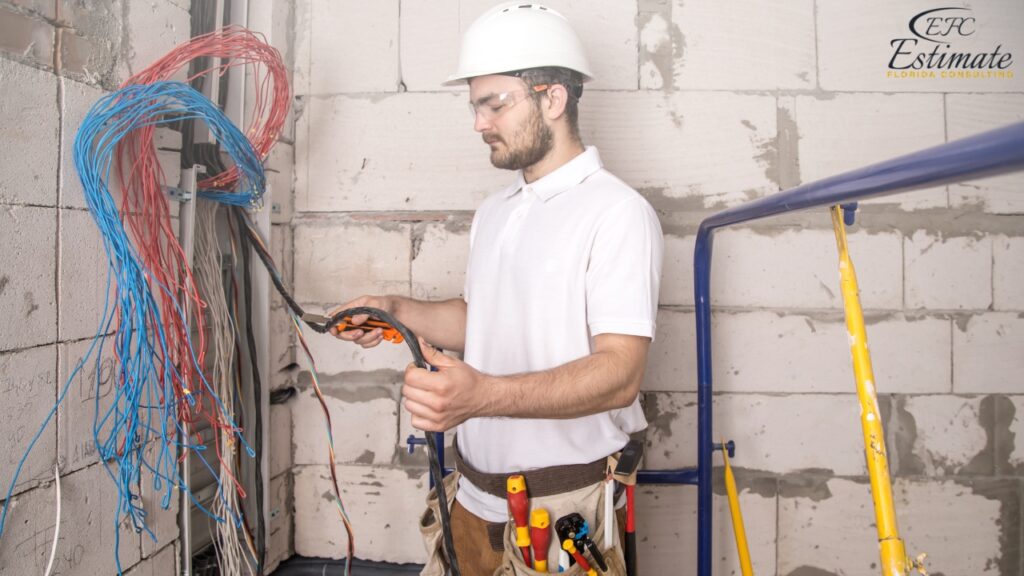
Compliance
Wiring a house to meet local building codes and regulations is essential. Compliance ensures that the house passes inspections and avoids potential legal issues. Up-to-code wiring also enhances the resale value of the property, making it more attractive to potential buyers. Adhering to building codes also ensures that the electrical system is safe and reliable, providing long-term benefits for the homeowner. Proper documentation and compliance can also facilitate easier maintenance and future upgrades.
Future-Proofing
Investing in quality wiring and planning for future needs can save money in the long run. Installing extra outlets, wiring for smart home systems, and other considerations can add convenience and value to the home. Future-proofing the wiring ensures that the house can accommodate new technologies and electrical demands as they arise. This foresight can prevent costly upgrades and modifications in the future. Homeowners who plan for future electrical needs can avoid disruptions and additional costs when they decide to integrate new technologies or make changes to their home.
Cost-Saving Tips
Plan Ahead
Planning the electrical system early in the construction process can help identify potential issues and reduce costs. Consider future electrical needs and include extra outlets and wiring for potential upgrades. Early planning allows for more efficient installation and can prevent costly changes or additions later on.
Get Multiple Quotes
Obtain multiple quotes from licensed electricians to compare prices and services. This can help you find the best deal and ensure that you’re getting quality work at a competitive price. Additionally, reading reviews and checking references can provide insights into the electrician’s reliability and workmanship.
Use Standard Materials
Opt for standard materials and fixtures instead of custom or high-end options. Standard materials are often more affordable and readily available, helping to reduce overall costs. Choosing quality standard materials can still provide reliable performance and longevity without the premium price of custom options.
Perform Some Tasks Yourself
If you’re comfortable with basic electrical work, consider doing some tasks yourself, such as installing outlets and switches. However, always leave complex and critical tasks, such as wiring the main electrical panel, to licensed professionals. DIY tasks can save labor costs, but it’s important to ensure that all work complies with safety standards and codes.
Plan for Contingencies
Include a contingency budget of 10-20% to cover unexpected expenses. This ensures that you are prepared for any unforeseen issues that may arise during the project. Planning for contingencies can provide peace of mind and financial flexibility, allowing you to address any surprises without derailing your budget.
Get 5 New Leads Next 7 Days With Our System
- Multi-Family Building
- Hotel Building
- Hospital Building
- Warehouse Building
- High-Rise Building
- Shopping Complex
Conclusion
Wiring a 2,000 square foot house is a significant investment that requires careful planning and budgeting. By understanding the various costs involved and the factors that influence these costs, you can make informed decisions and ensure the success of your wiring project. Investing in high-quality materials, working with experienced professionals, and planning for contingencies can ensure a successful and cost-effective wiring installation. Properly managing the construction process not only ensures compliance with safety standards but also maximizes the long-term benefits of the investment. Taking a proactive approach to project management and budgeting can lead to a successful outcome, providing a safe, efficient, and modern electrical system that enhances the comfort and functionality of your home for years to come. By considering all aspects of the installation process, from materials to labor and additional features, you can create a comprehensive plan that meets your needs and fits your budget.
FAQs
The total cost to wire a 2,000 square foot house typically ranges from $15,210 to $29,250. This estimate includes materials, labor, and additional expenses such as permits and system upgrades.
The cost of wiring materials can range from $6,240 to $11,570. This includes wiring, electrical panels, circuit breakers, outlets, switches, and other necessary components.
Costs vary based on the quality and type of materials used. Higher-quality copper wiring is preferred for its conductivity and durability. The cost also depends on the length and gauge of the wire needed for different circuits in the house.
Labor costs can range from $6,500 to $13,000. This includes the installation of wiring, electrical panels, outlets, switches, and inspection and testing of the system.
Labor costs are influenced by the complexity of the job, local labor rates, and the electrician’s experience. Complex layouts, multiple circuits, and challenging room designs can increase labor costs.
Additional costs can include permits ($650 – $1,040), inspections ($650 – $1,040), and system upgrades ($1,300 – $2,600). Miscellaneous expenses, such as drywall repairs, can also add $520 – $1,040.
The layout and design of the house can significantly impact wiring costs. Complex layouts with multiple floors, intricate room designs, and large open spaces can increase the amount of wiring and labor required.
The electrical needs of the house, including the number of outlets, switches, light fixtures, and special systems, will affect the overall cost. Homes with higher electrical demands will require more materials and labor.
To save on wiring costs, plan the electrical system early, obtain multiple quotes from electricians, use standard materials, and consider performing minor tasks yourself. Include a contingency budget of 10-20% for unexpected expenses.
Google Reviews



Process To Get It Cost to Wire a 2,000 Sq Ft House Estimate Report
Here I am going to share some steps to get it cost to wire a 2,000 sq ft house estimate report.
-
You need to send your plan to us.
You can send us your plan on info@estimatorflorida.com
-
You receive a quote for your project.
Before starting your project, we send you a quote for your service. That quote will have detailed information about your project. Here you will get information about the size, difficulty, complexity and bid date when determining pricing.
-
Get Estimate Report
Our team will takeoff and estimate your project. When we deliver you’ll receive a PDF and an Excel file of your estimate. We can also offer construction lead generation services for the jobs you’d like to pursue further.

